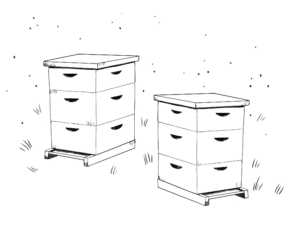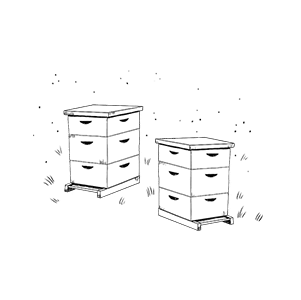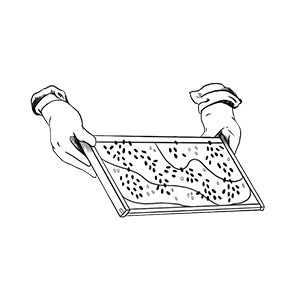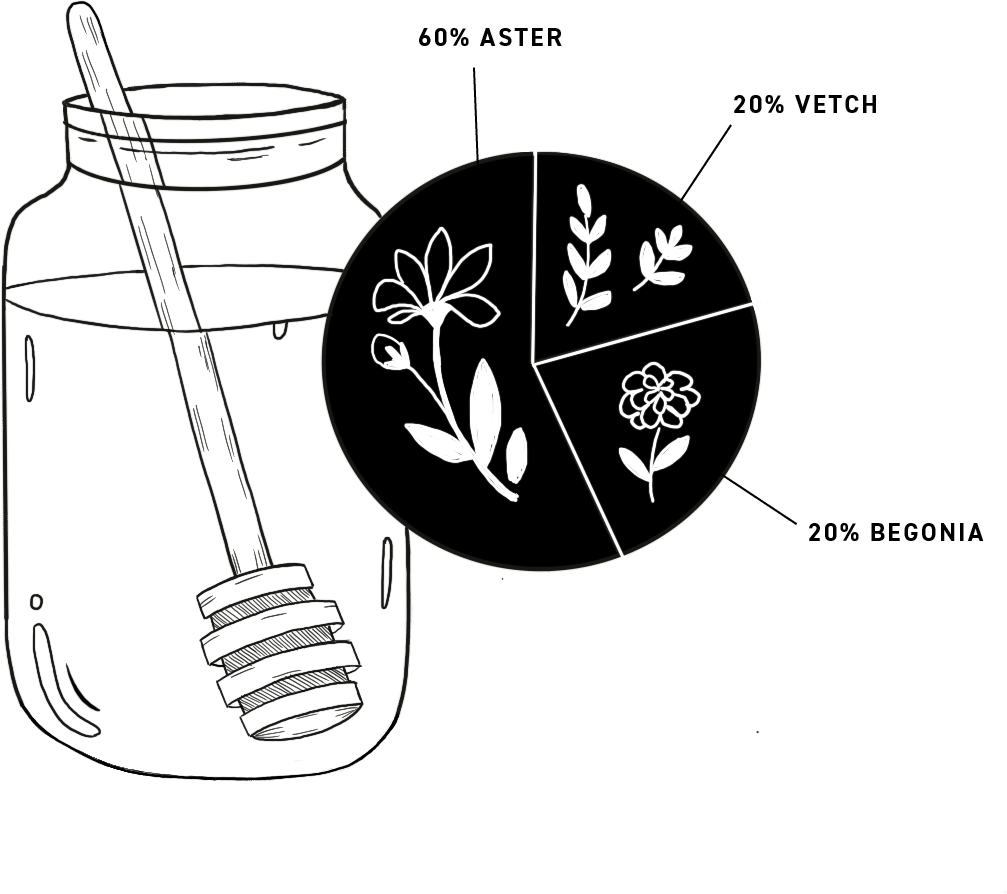Managed Beehives for Your Property in Greater Phoenix
The Best Bees Company maintains a nationwide network of data-yielding beehives to monitor ecosystem health and fuel research on pollinator habitat and biodiversity. Since 2010, we’ve worked with residential and commercial clients to protect and promote pollinators and biodiversity.
Request a Phone Assessment
Find out if your property is right for bees
Our Mission
Our mission is to promote and protect biodiversity and pollinator health here in Phoenix and across the country. We hire local beekeepers with personal experience beekeeping in your area to install and care for the beehives on your property. Our beekeepers are field ecologists, collecting data points at every visit in our proprietary software system, Bzzz. This wealth of data is used to drive the science of pollinator and biodiversity health forward with scientific partners such as NASA, MIT, and Google Earth.


Beekeeping for Your Commercial Property
We offer innovative solutions that can help bring your corporate sustainability programs to life. These include the highest standards on beekeeping, as well as developed workshops and programs that will engage your community — employees, guests, tenants, community leaders, and the public — in your sustainability work.

Commercial Services
Beekeeping for Your Backyard
If you’d like to help save the bees, build a healthier environment, pollinate your garden, and have your own honey harvest, then our residential service is perfect for you! We offer full-service beekeeping designed for homeowners in a wide range of environments. Regardless of the size of your property — whether you garden on a balcony or have acres of land — we can install and manage one or several hives for you. .

Residential Services
Beekeeping Education
![]()
We offer a number of educational programs at varying price points that have proven popular with commercial clients, schools, gardening clubs and organizations promoting sustainability.
Pre-recorded and live hive tours
Experience a guided tour as one of our bee experts takes you on a walk-through of your hive visits and inspections. Get a glimpse of the busy life of bees, and learn more on how to keep tenants engaged with their local environment.
Meet an expert beekeeper
Participate in a beekeeper-led webinar and Q&A session. This virtual event is a great opportunity to learn about your bees through the lens of a beekeeper. We’ll discuss the data collected from your beehives, why bees matter, and what it's like to take care of your bees.
Virtual keynotes
Gain insight into the world of bees with our Chief Science Officer and Founder, Dr. Noah Wilson-Rich. Noah's knowledge of honeybee health and his passion for bee research will leave your audience spellbound, and with a wealth of new insight about our natural world. Our virtual keynote package includes signed copies of his book, The Bee: A Natural History.
We also offer free and open online programs, such as live meetings with beekeepers and educational webinars.
How Professional Beekeeping Works

Installation
We help you choose an ideal location to establish one or more beehives at your home or workplace.

Maintenance
Our impassioned and experienced beekeepers service your beehives once a month, providing high-quality care and detailed reports.

Harvesting
You keep 100% of the raw honey produced. We’ll handle the rest— small batch extraction and bottling with personalized labels.

Research
At every visit, we collect data and share it with our research partners to advance the science of beekeeping and improve the health of pollinators worldwide.
Safe
Best Bees’ hives are stocked with Apis mellifera ligustica. Bred for passivity, they’re considered to be the most docile species of honeybee.
Secure
Our beekeepers have extensive experience working in densely populated areas in and around Phoenix. This includes on rooftops, corporate campuses, and residential neighborhoods.
Insured
We have a full insurance policy and can provide you with a certificate of insurance (COI) if needed. Notably, Best Bees has never had to file an incident report since our operation began in 2010.

Phoenix Beekeeping Laws
In the city of Phoenix, you must have at least 1,700 square feet of land to have a beehive, and hives can't be kept within 5 feet of the property line.
Surrounding communities have their own regulations — you can contact your city clerk for specific information regarding your area.
Phoenix Service Area
We service hives in a 90-minute driving radius from the Phoenix city center, including in the following counties:
Maricopa County
Pinal County
Gila County
Yavapai County
What's Included
- Site evaluation
- Hand-crafted, all-natural beehive equipment installed onsite
- Colonies of docile, Italian honey bees (Apis mellifera ligustica)
- Maintenance and care from experienced beekeepers
- Full-time customer service team available by phone or email
- Pest control treatment methods, including Varroa mite treatment
- Replacement colonies as needed
- 5-10lbs of 100% raw honey
About Local Honey
Honey production varies from colony to colony, depending on the strength of the Queen, the health of the hive and the availability of nourishment. New colonies tend to produce less honey than established ones. When there is a surplus of honey, we will harvest and jar it for you.
The composition and flavor of honey varies from hive to hive as well, depending on the floral species available to pollinate. This means that honey from your hive will have a unique profile. Tasting it, you’re tasting the composite of all the flowers your bees have visited!

HoneyDNA
We pioneered the process of identifying the exact percentage of various pollen species found in honey through advanced genomic sequencing. Understanding where bees foraged reveals which plants best feed pollinators in the local environment.
Already Have a Hive?
At Best Bees, we’re proud to be a part of the local beekeeping community in every area in which we work.
If not already a member of one of the area’s beekeeping associations, we encourage you to join. There are three local associations to consider: Illinois State Beekeepers Association (www.ilsba.com), Cook-Dupage Beekeepers Association (www.cookdupagebeekeepers.com), and Chicago Honey Co-op (www.chicagohoney.com).
Join our Citizen Scientist movement! Here are some ways you can participate:
- Plant more pollinator habitats on your property
- Use bee-safe pesticide alternatives
- Get involved in local and national lobbying
- Submit your honey for HoneyDNA results — these will be shared with our nonprofit partner The Urban Beekeeping Lab.
You can also post your data to bee Citizen Science programs like iNaturalist, The Great Sunflower Project, and Beecology Project.
We gladly share the learning from our research and our best practices with everyone. To learn more about the findings of our research work, visit https://bestbees.com/white-paper-resources/. To watch one of the TED Talks by our Founder and Chief Science Officer Dr. Noah Wilson-Rich, visit our Research page https://bestbees.com/research/ . Finally, to stay in the loop on our latest thinking, read our blogs at https://bestbees.com/blog/
Frequently Asked Questions
We install and maintain honeybee hives on your property. Our expert beekeepers monitor the health of your bees and perform a variety of tasks throughout the year to help them thrive. At each visit, we also capture a range of metrics and share the data with renowned research partners to help the scientific community better understand the plight of pollinators. Towards the end of the season, we extract the honey and jar it for you.
About once per month for our Chicago Area hives. If your bees are distressed and need extra support, supplemental visits are included. We coordinate each visit in advance and send a summary report afterward.
Only a few square feet! A beehive takes up as little as 2’ x 2’ x 3’. Our beekeepers need a few feet around the hive to access it, and the bees’ flight path will need to be unrestricted.
In the Chicago area, we typically install hives when all threat of winter has passed, which is typically in mid April. Installations after June are accommodated on a case-by-case basis, depending on our inventory levels.
We fully guarantee the health of our bees and queens. If a colony dies, we’ll replace it with a healthy one from our own stock at no additional cost. While we hope each of our hives will thrive for years to come, the reality is that pollinators are still dying at an unprecedented rate. In places like Chicago, where winters are often severe, we can lose 40-50% of our hives annually.
Our Boston-based headquarters is staffed full time and available Monday through Friday during work hours by phone or email to answer any questions. When a colony requires extra attention, additional visits are made at no cost to you.
Yes, we provide a range of event support packages for our commercial clients. See Hive Programs for Commercial Customers for details.
Green roofs earn credits toward a building’s LEED (Leadership in Energy and Environmental Design) certification. Green roofs provide vegetation for water control, wildlife habitat, and better urban air quality. Honeybees can help maintain the green roofs that are becoming more common in big cities and thus contribute to a building’s LEED rating.
We service hives in the city of Chicago and throughout the metropolitan area, from the Wisconsin border in the north to rural areas 50 miles southeast of the city, including the counties of Cook, Will, and DuPage.
We handle visit scheduling for you. We’ll contact you at least 72 hours in advance via email.

